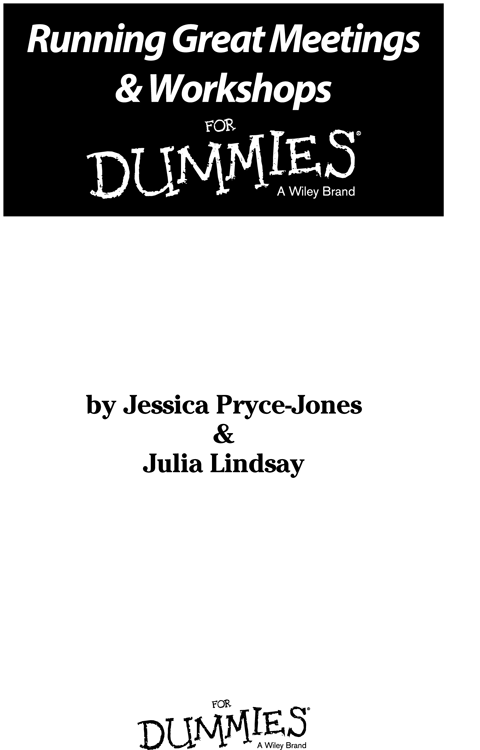
Running Great Meetings & Workshops For Dummies
Published by:
John Wiley & Sons, Ltd.,
The Atrium, Southern Gate,
Chichester,
www.wiley.com
This edition first published 2014
2014 John Wiley & Sons, Ltd, Chichester, West Sussex.
Registered office
John Wiley & Sons Ltd, The Atrium, Southern Gate, Chichester, West Sussex, PO19 8SQ, United Kingdom
For details of our global editorial offices, for customer services and for information about how to apply for permission to reuse the copyright material in this book please see our website at www.wiley.com .
All rights reserved. No part of this publication may be reproduced, stored in a retrieval system, or transmitted, in any form or by any means, electronic, mechanical, photocopying, recording or otherwise, except as permitted by the UK Copyright, Designs and Patents Act 1988, without the prior permission of the publisher.
Wiley publishes in a variety of print and electronic formats and by print-on-demand. Some material included with standard print versions of this book may not be included in e-books or in print-on-demand. If this book refers to media such as a CD or DVD that is not included in the version you purchased, you may download this material at http://booksupport.wiley.com . For more information about Wiley products, visit www.wiley.com .
Designations used by companies to distinguish their products are often claimed as trademarks. All brand names and product names used in this book are trade names, service marks, trademarks or registered trademarks of their respective owners. The publisher is not associated with any product or vendor mentioned in this book.
LIMIT OF LIABIL-ITY/DISCLAIMER OF WARRANTY: WHILE THE PUBLISHER AND AUTHOR HAVE USED THEIR BEST EFFORTS IN PREPARING THIS BOOK, THEY MAKE NO REPRESENTATIONS OR WARRANTIES WITH THE RESPECT TO THE ACCURACY OR COMPLETENESS OF THE CONTENTS OF THIS BOOK AND SPECIFICALLY DISCLAIM ANY IMPLIED WARRANTIES OF MERCHANTABILITY OR FITNESS FOR A PARTICULAR PURPOSE. IT IS SOLD ON THE UNDERSTANDING THAT THE PUBLISHER IS NOT ENGAGED IN RENDERING PROFESSIONAL SERVICES AND NEITHER THE PUBLISHER NOR THE AUTHOR SHALL BE LIABLE FOR DAMAGES ARISING HEREFROM. IF PROFESSIONAL ADVICE OR OTHER EXPERT ASSISTANCE IS REQUIRED, THE SERVICES OF A COMPETENT PROFESSIONAL SHOULD BE SOUGHT.
For general information on our other products and services, please contact our Customer Care Department within the U.S. at 877-762-2974, outside the U.S. at (001) 317-572-3993, or fax 317-572-4002. For technical support, please visit www.wiley.com/techsupport .
A catalogue record for this book is available from the British Library.
ISBN 978-1-118-77046-7 (hardback/paperback) ISBN 978-1-118-77044-3 (ePDF) ISBN 978-1-118-77043-6 (ePub)
Printed in Great Britain by TJ International, Padstow, Cornwall
10 9 8 7 6 5 4 3 2 1
Chapter 1
The Business Case for Better Meetings and Workshops
In This Chapter
 Reviewing why people hate meetings
Reviewing why people hate meetings
 Recognising when people get a lot from their workshops
Recognising when people get a lot from their workshops
 Understanding meetings and workshops: similarities and differences
Understanding meetings and workshops: similarities and differences
Everything important that youll ever do at work involves other people. Even if a large chunk of your working day is solitary, at some point, colleagues, contacts, critics or clients come into the equation. They check in with you or you with them because everyone wants to be clear about whos on track, who needs help, or whos made fantastic progress. But doing this one person at a time is inefficient.
So you have a meeting.
In most of our organisations and certainly those where interesting knowledge-work is being done, complexity is the order of the day. What we all do has become more specialised, more process-oriented and more project-driven. This means lots of complex problem-solving and continuous learning as everyone pulls together to meet deadlines, respond to changing environments and maximise both performance and productivity. You simply cannot do this one person at a time.
So you get together for a workshop.
When you leave a meeting or a workshop having done really great work in a group, youll feel buzzed and motivated. But the problem is that many meetings achieve just the opposite: Participants walk out deflated, de-energised and sometimes desperate. This chapter outlines the reasons for those negative feelings and then points you in the right direction for fixing them.
Reviewing Why People Hate Meetings
If you dont enjoy your meetings, youre part of a very large worldwide club. Many people feel the same as you. But heres the strange thing: Even when you hate your meetings, when you emerge feeling frustrated and furious, you still brace yourself and trudge off to attend the next one. Then you schedule yet more.
Too many of us are on meeting treadmills believing that poor meetings are a necessary evil of business life. We go to them because we feel we have to; we go to them to be seen. But we dont enjoy them because they suck. Theyre poorly planned, badly run and add zero value.
And we all sit quietly back colluding while colleagues make it much worse when they fail on the preparation front. The result is that because nothing much gets done, more and more participants behave badly, but no one ever puts it right.
So what needs changing?
Being clear about what everyone dislikes
To clarify what people dislike most about their meetings, we decided to run a small research project. We asked a class of 80 executive MBA students doing a part-time degree what their top reasons for disliking meetings were. Then we collated the most repeated themes and put them into a questionnaire.
We ran that questionnaire online and face-to-face in Kenya, Singapore, South Africa, The Netherlands and the UK. In the end, we had 675 answers from 28 different nationalities, all of whom were running teams. Some were supervisors, and others were senior managers. Table lists the top seven reasons they gave for disliking their meetings.
Table 1-1 Top Seven Reasons People Hate Their Meetings
I Dislike Meetings Because | Percentage of Answers |
They are poorly structured | |
They go off-topic | |
They are too long | |
There isnt an agenda | |
Others dont prepare | |
The presentations are boring | |
We dont do feedback | |
Poorly structured
This item is a travesty. It takes about five to ten minutes tops to create a decent structure to a meeting; its not a lot of hard work. All it involves is knowing the items you want to deal with and putting them into some kind of sensible order without leaving the toughest subject to last.
That this appears at the top of the list shows you that meeting leaders arent bothering to do even a tiny amount of thinking before getting into a room. If they dont, why should anyone else? (See Chapter for how to design a great agenda.)
Go off-topic
What this implies is that meeting management skills are poor and that people running meetings cant steer productive participation. What we see in practice is that the chair or manager of a meeting often gets caught up in the conversation. So they are talking rather than thinking about whats happening and how to keep it all on track. (Read Chapter for the skills it takes to keep a meeting on track.)
Next page
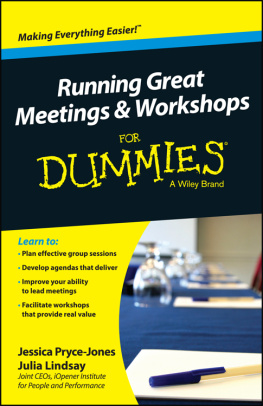

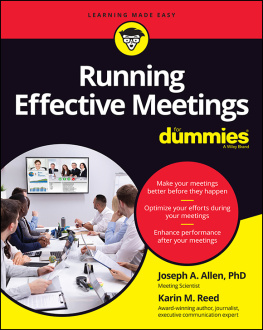

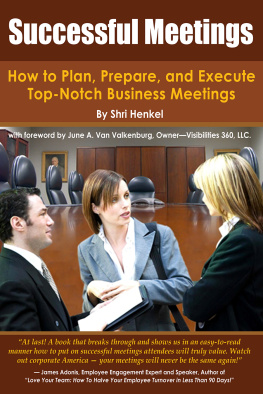


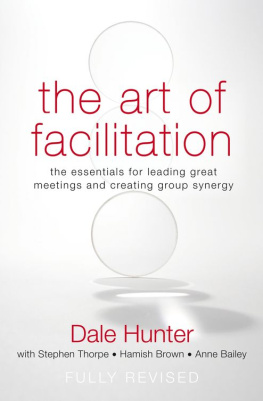

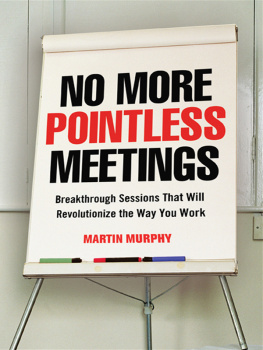
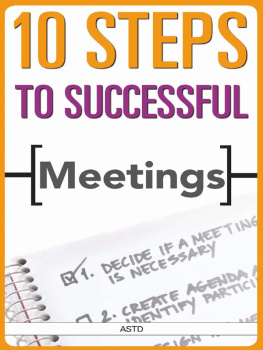
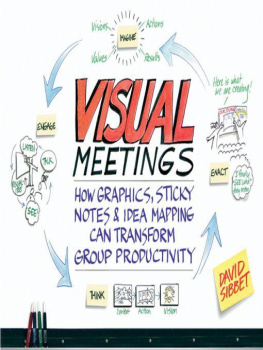

 Reviewing why people hate meetings
Reviewing why people hate meetings